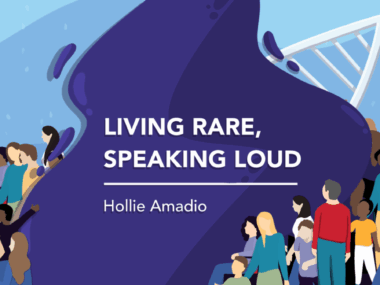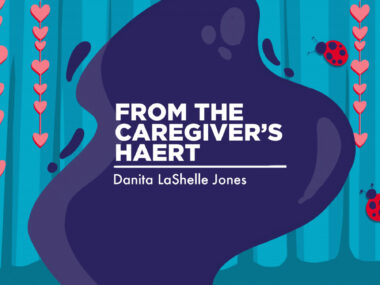From isolation to community: The power of connection
Finding people who share our chronic conditions helps affirm and empower us
Written by |

Living with chronic illness can be profoundly isolating. The physical pain, emotional strain, and constant misunderstanding from the world around us can often leave us feeling that no one truly gets it. But within that loneliness lies a transformative truth: Community changes everything.
When we connect with others who share our struggles, something profound happens. Community becomes a lifeline — not just because of shared symptoms or diagnoses, but because of shared humanity. It’s the comfort of knowing someone else understands our reality without explanation, validates our emotions, and reassures us that we’re not alone. These bonds transcend mere acquaintance, creating a family forged in resilience, empathy, and mutual strength.
My journey with chronic illness has been anything but straightforward. Diagnosed with hereditary angioedema (HAE), I was already managing a full-time battle when, at 27, multiple sclerosis (MS) came crashing into my life.
What followed was a relentless storm: I lost feeling on my left side, went blind, and one night collapsed trying to get to the bathroom, temporarily losing my ability to walk. A cane became my constant companion, alongside a host of other symptoms: chronic pain, memory loss, choking, numbness, and even the bizarre challenge of struggling to swallow my own spit.
As if that weren’t enough, my HAE seemed determined to keep the chaos alive, flaring up whenever MS eased. It felt like the two were in a toxic partnership, relentlessly trading off which would torment me next.
Unsurprisingly, my mental health spiraled. I was angry, stuck in self-pity, and convinced my life was over.
From a chance meeting to many bonds

Photos from the 2023 Hereditary Angioedema Association National Summit and the organization’s Capitol Hill Day in 2024. (Courtesy of Hollie Amadio)
Then, when I made a mundane trip to UPS, a woman noticed my MS mask and asked if I had multiple sclerosis. She ran a support group and invited me to join. That group became my anchor. Hearing others’ stories, sharing my own, and being surrounded by people who understood gave me a new perspective.
Slowly, my mental health improved, and with it, my physical health. I even put my cane into the shed and closed the door — a powerful reminder of how deeply mind and body are connected.
Fast forward to 2023, when I attended my first Hereditary Angioedema Association National Summit in Florida. I went alone, determined to protect my peace and fully immerse myself in the experience. It turned out to be one of the best decisions of my life. For the first time, I met others with HAE, people who truly got it.
The summit was a space filled with unmatched energy and positivity. I made it a point to connect with as many people as possible, choosing a different table at every meal and soaking in every conversation.
I even created connections that didn’t fade once we all went back home: a group of incredible women, all five of us strangers who eventually started a group chat that remains alive and well. Even if weeks pass without a word, in the second that one of us needs support, the rest are there, no hesitation. They’ve become a kind of core tribe for me within the larger HAE community, offering encouragement, humor, and understanding when I need it most.

At left and below, a group taking part in a September rock-climbing event. Top right, people are gathered in September at the National Multiple Sclerosis Society’s “taste of generosity” dinner in Baltimore. (Courtesy of Hollie Amadio)
But they’re not my only connection with those who have my diseases. Far from it. Over the years, I’ve built a network of support through online forums, volunteering, activism, in-person meetups, and even a weeklong rock-climbing program, sponsored by First Descents and featuring 13 other MS warriors I’d never met. I can’t begin to explain what I gained from that trip and the connection we all shared, and will always share. Since then, we’ve participated in secret Santa exchanges for the holidays.
These experiences have taught me that community isn’t about finding just one tribe; it’s about weaving together a tapestry of connections, each offering something unique.
Beyond the emotional support, community empowers us to do more than survive. It helps us thrive. Together, we advocate for change, amplify our voices, and push for advancements that would be impossible alone. Community is a mirror, reflecting our strength back to us when we’re too drained to see it ourselves.
The chronic illness community is living proof of the power of connection. Illness may shape parts of our lives, but it doesn’t define us entirely. In coming together, we uplift one another, reminding ourselves that even in our hardest moments, we’re never truly alone.
Note: Angioedema News is strictly a news and information website about the disease. It does not provide medical advice, diagnosis, or treatment. This content is not intended to be a substitute for professional medical advice, diagnosis, or treatment. Always seek the advice of your physician or other qualified health provider with any questions you may have regarding a medical condition. Never disregard professional medical advice or delay in seeking it because of something you have read on this website. The opinions expressed in this column are not those of Angioedema News or its parent company, Bionews, and are intended to spark discussion about issues pertaining to angioedema.




Leave a comment
Fill in the required fields to post. Your email address will not be published.